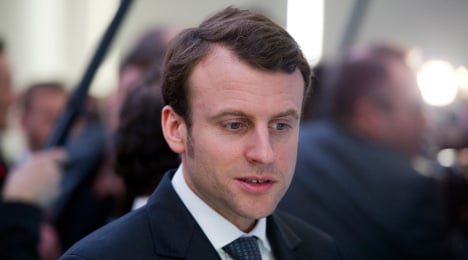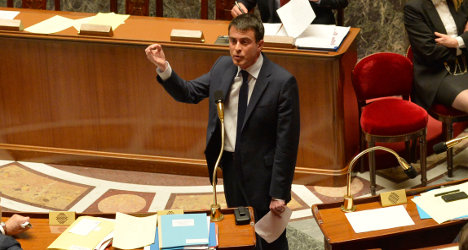"I won't take any risks," Manuel Valls told deputies, as the government struggled to win a parliamentary majority over the hotly contested reforms.
"This legislation is important, even essential, to relaunch growth, create employment, to overcome certain blockages in our economy," he said.
"I won't take a risk with a bill like this which I consider essential for our economy," Valls told deputies.
Deputies had been set to vote on the highly divisive package of measures, including the extension of Sunday shopping drawn up by the country's energetic and youthful banker-turned-economy minister Emmanuel Macron, who says he has received death threats over the reforms.
But with so many Socialist MPs in the majority opposing the bill, because they see it as too pro-business, Valls decided he couldn't take the risk of the government suffering an embarrassing defeat.
He decided to use the clause known as "49-3" which allows the government to pass a bill, without a parliamentary vote.
The bill is considered as having passed unless the parliament votes through a motion of no-confidence in the government — which analysts see as highly unlikely.
The right-wing opposition UMP party has already vowed to table a vote of no-confidence but political analysts say it is highly unlikely that the rebel Socialists will choose to bring down the government and risk their own seats over the reforms.
Initially the bill had been expected to pass despite the opposition, but as the day went on it became clear that the government may not have the support they need.
According to several MPs who spoke to AFP on Tuesday, Valls had feared the reforms will not get through a parliamentary vote, with numerous left wing rebels set to vote against it.
"I am not being dramatic. As I speak now, the bill will not pass. It would be a considerable blow," Valls reportedly told a group of MPs behind closed doors.

In rowdy scenes in parliament, the country's energetic and youthful banker-turned-economy minister Emmanuel Macron passionately defended his bill, which he sees as vital to energise the eurozone's second-largest economy.
A major plank of the reform package is to extend the number of Sundays that shops are allowed to open from a maximum of five per year to 12.
In certain areas classed as "international tourist zones" — such as in Paris the Champs Elysees, the Saint-Germain area and the Boulevard Haussmann where most of the capital's department stores are based — shops would be able to open every Sunday.
Shops in these zones, set also to be created in the French Riviera cities of Cannes and Nice, will also be able to stay open until midnight seven days a week.
Employees working between 9:00 pm and midnight will receive double pay and their trip home, and the employer will also cover any childcare costs.
With the reforms, Paris is bidding to cement its reputation as the world's number-one tourist destination.
"Do we want millions and millions of tourists — notably Chinese — who come to the capital to leave us and go and do their shopping in London on a Sunday?" asked Valls in a recent interview.
But the Socialist mayor of Paris, Anne Hidalgo, is staunchly opposed to extending Sunday opening and has described it as a "backward step for democracy."



 Please whitelist us to continue reading.
Please whitelist us to continue reading.
Member comments